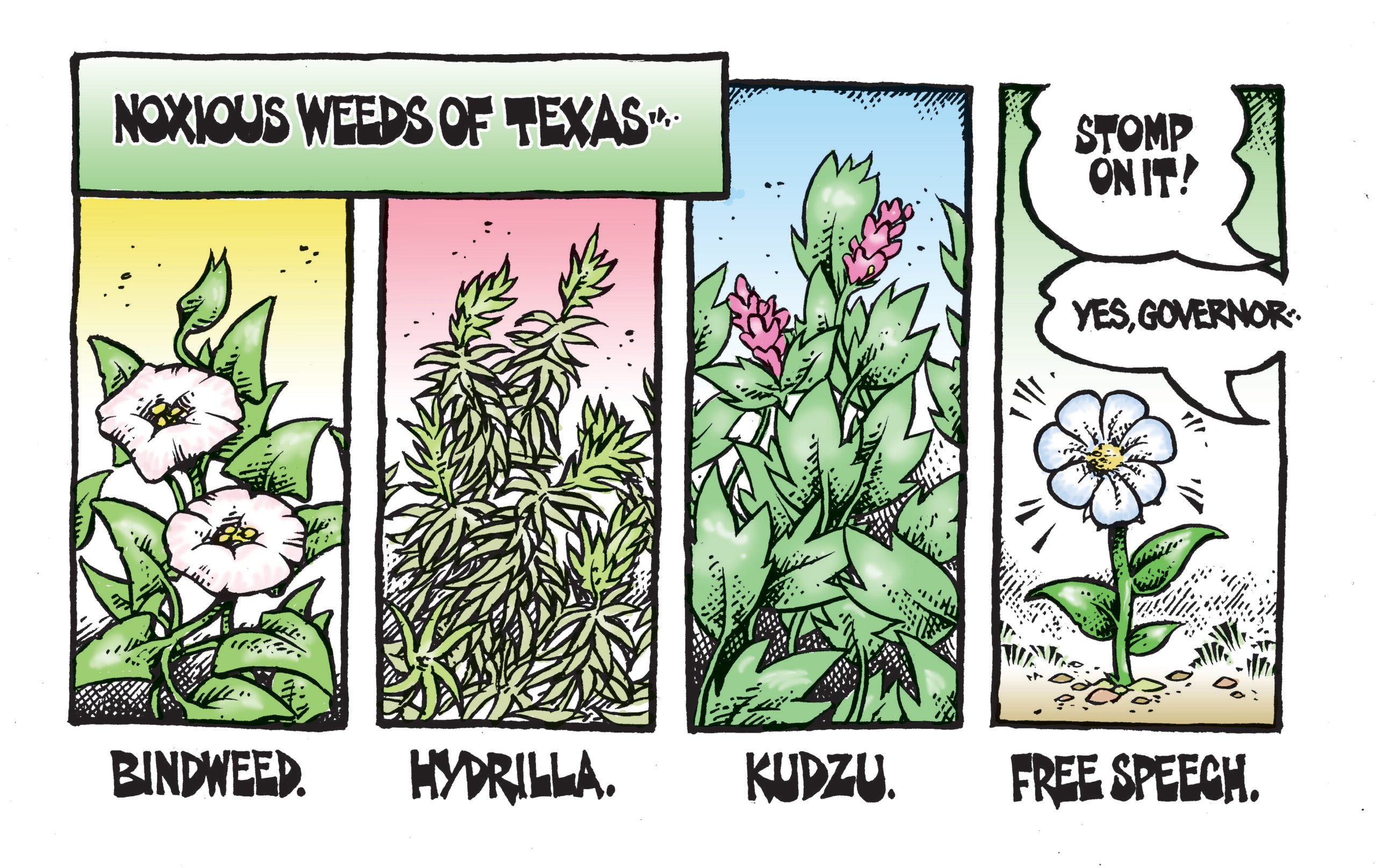ustxtxb_obs_1959_06_27_50_00009-00000_000.pdf
Page 7
The one great mole of composition is to rpeak the truth. Tamt.E.Au `NATURE PURGES LIKE GREAT DRAMA The Texas Observer An Independent-Liberal Weekly Newspaper We will serve no group or party but will hew hard to the -truth as we find it and the right as we see it. `Better garden and read Gandhi, dine on. vegetables, sup on yogurt an d black bread, and sleep anights.’ Mr. Bedichek’s unusual mind had as many sparkling facets as a well-cut diamond. And there is one thing sure, nothing very comprehensive can be said about him in a few pages. I attempt no more than a few impressions from conversations with him and letters from him. There was a near-mysticism about his devotion to Nature. He wrote to me ten years ago, Only Nature is normal, no matter how eloquently Oscar Wilde and his aesthetes argue the contrary. The aseptic sea cleanses all the filth the land dumps into it from ten thousand gorged and retching rivers. Nature does the same for those souls who understand and practice the occult rite of immersion in. her. But no Methodist sprinkling will do. It must be a thorough-going Baptist immersion. It purges, in the Aristotleian sense, like great drama. When I went to live in New York City after World War II, nearly every letter that he wrote to me contained a warning against what he called “the city’s fetid atmosphere” and an admonition never to accept its values. Then, while he was visiting with us a couple of years ago in New York, I remarked to him that I had been having a series of dreams involving sights a n d sounds of my youth in Travis County; swimming naked up on Barton Creek, roosters crowing, whip-poor-wills calling in the woods. He , nodded eagerly and psychoanalyzed. me on the spot. “Why those dreams are simple, Johnny. It is’ nothing more than your body and soul crying out against the unnatural environment of this terrible city. Your body is an animal’s body, my boy, and your organs, every fiber in you, must have contact with Nature. Your skin needs the natural heat of summer, the natural cold of winter; your ears need to hear the natural sounds of the earth; your eyes must behold the natural beauty of the land; your soul must have exposure to the eternal drama of the changing seasons.” Then followed a resounding denunciation of air-conditioning and central heating as creators of unnatural environment that would have panicked our appliance manufacturers. In the garage study where he spent so much time, Mr. Bedichek had only a wood stove for heat in the winter \(fueled by w o o d he fetched in from pastures and dows for coolness in the summer. It was a comfortable place any season. HE DELIGHTED in observing all the flora and fauna of’ the earth, though the behavior of some of Nature’s creatures and plants distressed him. Not long ago he acted out, with grimaces and hostile gestures, the aggressive nature of a certain thistle, explaining how the species choked out and destroyed all plant life in its vicinity. Some years ago, in answer to a letter that I had written him observing that the bluejay was the bully-boy of the bird world, he wrote, Yes, the jay is really a ter rible bird. He is an Ishmaelite, his bill is against every bird. The other morning I started across the back yard and a headless Inca dove fell at my feet, the dove that really summarizes all the gentleness and peace-lovingness attributed in our folklore to the species. Following the headless dove and reaching the ground almost at the same time was a ravenous bluejay. I had to kick him off his prey. But after I had identified the specimen, I put it up in, the tree so that he MR. BEDICHEK’S gray hairs were testament to his many days here on earth. In spite of this, the atmosphere of youth hovered about him always, even to the moment he came to ‘shuffle off this cortal coil.’ This phenomenon is best expressed in a letter he wrote me a few years ago: Vol. 51 When the subject is Roy Bedichek, there is a temptation to write about the man rather than his wor,$. Even for me, who can not claim to have been a close friend \(although my father was is strong. I had hoped to know him better. I last saw him when he stopped the light truck he was driving near his home, seeing me afoot \(I was going only a few me a hearty clasp, said he was glad I had moved to Austin. That was like him: no questions; no “why had I moved; what did I propose to do.” He was simply glad. A little later I passed by his house and saw how green his garden was, with a row of tall corn in it. And I commenced to spin a scheme. “He must work certain hours in his garden,” I thought. “I could ask him to let me come then: I would not be encroaching on his time and en -By Ward Lockwood Courtesy, Mrs. Roy Bedichek A Woodcut From Bedichek’s First Book ergy. He loves to talk, and this way he could talk without the interruptions that are always forthcoming in a group of people.” The scheme was never more than half spun. I console myself with the reflection that Bedichek did, after all, succeed in conveying his rich and spacious mind on the printed page, where it is more eloquent than it could ever have been in talk. For he was a minute observer -and a large thinker, he was, I think, the finest artist in prose that has written in Texas, about Texas. By the restriction “in Texas, about Texas” I mean to limit the field so as to exclude a very few stylists who, like Katherine Anne Porter, have not been especially concerned with the region. Miss Porter said, in a recent interview in Austin \(Observer, Oct. is the only “serious” writer to come out of Texas. What she should have said, I believe, is that she is the only serious writer of imaginative works to come out of Texas. There could be no cavil against that statement. found many flowers and forgot all about the little vixen. I know all this must have happened or I wouldn’t have such a longing to get back into living in the wild. My next incarnation is impending, and I’m hoping. JOHN HENRY FAULK TEXAS, JUNE 27, 1959 ‘He seemed to me to be a star of the first magnitude.’ on “Fields and U.S the feel of the Texas hill country, something more than just a picture, without ever resorting to the deadly method commonly known as description. Elsewhere, by subtle suggestion, he contrives to give us the feel of the egret’s courting dance. And here we must insist on a quotation, for this is the substance of the whole Bedichek philosophy, of his Yea to life: “I come to the conviction that some eighteen-million centuries after the nebula cohered into an orb, something new entered, not at all controlled but destined eventually to dominate physical laws or at 1:ast to adapt and use them for its own purpos6. Under this seaside spell I repudiate mechanism and all its thin and 10c per copy No. 12 shivering conceptions.” And then, there is the chapter on the mockingbird’s song, which is also a chapter on the appreciation of Walt Whitman, “the most contemptible old hog that ever rooted in the mire of his own imagination,”so the professors dismissed him when Bedichek was a boy. Bedichek formed his own opinion. And there is the last chapter, which deals with the theme of time, in much the same manner that Johann Sebastian Bach deals with a theme, taking it through modulations and changes of pace, coming back to it at the end. We start with the shadow an an. ancient oak; we come to the ancient cedar-chopper on the hillside; suddenly we are in ancient Rome and on islands back the Pacific; then we are back in the Texas hills with the cedar chopper again. I HAVE PASSED BY the garden, and it is withered and streaked with yellow, a sad reminder of mortality and of schemes that come to nothing. I console myself by remembering the word’s that we have, that are the essence of a rich life, and think of the vermillion flycatcher: “Poised high in the crystal-clear air that morning, he seemed to me to be a star of the first magnitude which the vanishing darkness had failed to take with it from the daylight sky.” CHARLES RAMSDELL `No affectation, no defense …’ Among Bedichek’s many admirable characteristics I remember primarily his unpretentiousness, his humility, his unaffectedness. I recall a visit last summer when he was over at my house checking data pertaining to physical anthropology for his new book. While showing him around the yard before he left, I thought of the cristate rainbow cactus my wife and I had found on a hike earlier in the spring. To my surprise these monstrous forms were new to him. “And you pass yourself off as a naturalist,” I said, “and have never heard of these? Texas naturalist? You don’t even know cactus.” “Listen,” he said, “hear that call? It’s a cuckoo. You see, I know birds.” “Then call yourself an ornithologist and not a naturalist. Texas naturalist! I believe you’re a fake.” Seriously and very quietly he said. “Don’t tell anybody. I’ve got by for a long time and few know I’m a fraud.” Whereupon we both had a good laugh. This is so typical of his sense of humor, his delight in teasing. With all of his tremendous knowledge there was no affectation, no defense of this ignorance, if it could be called that. Immediately his mind became alert. Why do these forms get this way? Is their genetic mechanism changed; does it go haywire? How commonly do they occur? And a dozen other questions I couldn’t answer. GILBERT Ma cALLISTER might have it back again. Jays assault myfig trees, ruining half a dozen figs at each visit of one, for they peck a bite out of one and then another, too impatient to sit down and eat one fig clear up. The devils do me a lot of damage, but I wouldn’t kill one. I would sorely miss him if he were gone. He is the most colorful permanent resident on my little hill of Post Oaks, and while his scream is raucous, his lovenote I find quite musical. So far as his own species is concerned, he is a very generous bird. If he finds something good to eat, he calls in all his fellows at once. With the species Homo Sapiens Mr. Bedichek took greatest delight, and, at times, found severest fault. His enlightened, searching mind had roamed freely through history, and he had achieved a position of wisdom and insight from which to observe the behavior of his own species. On matters political and social he had firm and liberal convictions, but when friends of his, men he had known in his younger years, became opposed to him in their opinions, he maintained a warm affection for them. Politicians and public servants who betrayed the faith of the people most infuriated him. He once wrote me that he was preparing a paper comparing Homo Sapiens with Rhattus Norveingus mankind with the brown rat, ‘the most imperialistic of his species.” In 1951 he wrote, Don’t get too discouraged over the state of the nation and of the world. We are launching out on an imperialist policy … that is the state of the public mind, or rather the public’s passion. To reason’ with it at present would be like petting a mad dog. And further on in the letter he commented, Men, my boy, are demons in disguise … ay, and women, too . more so, and more demoniacal than men. 0 u r breed, among all the animals in the world, is most cursed … and still, I would not, if I could, do as Whitman wanted to do`go and live with the animals; they are .so placid and uncontained.’ These terrible contradictions in the soul of a decent man will run him crazy if he dwells too much upon them. Better garden and read Gandhi, dine on vegetables, sup on yogurt and black bread, and sleep anights. Of a politician who had sacrificed principle for political expediency, and who, in Mr. Bedichek’s opinion, was power-drunk, he wrote me: “Did you ever notice that Homo Son.uvabichicus is one species that can never disguise itself?” Last year he wrote to me: “My wife and I simply choke up when we get to talking about the inarticulate inbecilities of Eisenhower.” I go to Barton’s every afternoon and have a delightful cooling off’. What a poem that place is! Do you not sometimes dream of its great towering pecan trees over ‘sparkling waters? The Apaches knew a good thing. Did you know that the whole south. bank of Barton, Creek from springs to mouth is one solid kitchen-midden built up through ages of occupation by Apaches and their predecessors? I used to get relics by digging almost anywhere along the bank. In a former incarnation I was an Apache, living on pecans and deer meat, working the excellent flint that protrudes here and there from the limestone ledges, and chasing my fleet-footed love over cliffs and down creek-beds. Her voice was ventriloquial and often led me like an echo far astray where I DVENTURES with a Texas la Naturalist, written when Bedichek was 70, is a work of art, if there ever was one. It is also what I would call “a classic of Texas literature,” if such a tired and tarnished word as “classic” did not seem more incongruous


